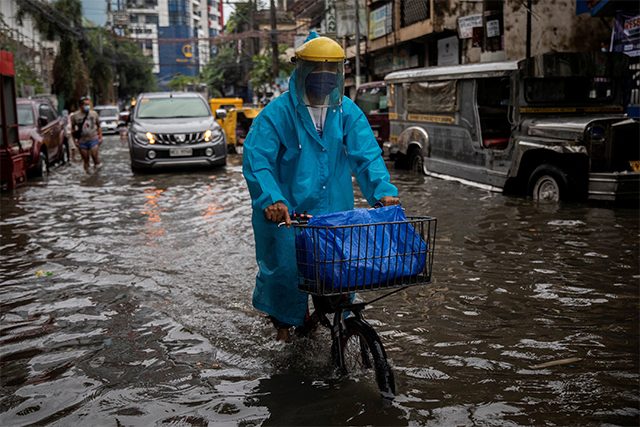
An environmental health organization urged local government units (LGUs) to strictly implement waste management laws to help minimize the flooding in urban areas amid heavy monsoon rains.
EcoWaste Coalition renewed its call for waste prevention and reduction as floodwaters submerged metropolitan streets and affected residents, commuters and those lining up for COVID-19 vaccines.
The National Capital Region experienced a continuous downpour of rains this week brought about by the southwest monsoon or “habagat” which was enhanced by a slow-moving tropical cyclone, Typhoon “Fabian.”
Another tropical cyclone outside the Philippine Area of Responsibility, Typhoon “Cempaka,” further enhanced the downpour.
These resulted in flash floods that inundated major roads in the metro such as Taft Avenue, Roxas Boulevard, areas around EDSA, parts of C5 and some streets in Makati, among others.
According to EcoWaste, strictly observing Republic Act 9003 or the Ecological Solid Waste Management Act can help mitigate the occurrence of floods.
“We all know that Metro Manila is vulnerable to flooding due to its inherent geographical characteristics that are aggravated by other factors such as the recklessly thrown garbage clogging up the inadequate urban drainage system,” Jove Benosa, the coalition’s Zero Waste Campaigner, said in a release.
“While we cannot do much to alter the region’s geography, we can surely help in mitigating the floods by preventing plastics and other discards, including COVID-related waste such as used face masks, from spilling into the storm drains and waterways,” he added.
The coalition said that 17 LGUs of the capital region “generate close to 10,000 tons of trash every day.”
Citing the Metro Manila Development Authority, it added that over 30 truckloads of garbage are collected from the 57 pumping stations operating all over the metro.
The group said that the strict implementation of Republic Act 9003 in every household “will avoid garbage from being produced, littered and dumped in streets, vacant lots, esteros and rivers.”
The waste law promotes waste avoidance and volume reduction, segregation at source, reusing, recycling, composting and other best practices in ecological solid waste management, excluding incineration.
It also bans the dumping of waste materials in streets, canals, esteros and other public places and penalizes such offenses with a fine of P300 to P1,000, or one to 15-day community service, or both.
“The honest-to-goodness implementation of waste separation at source, recycling, reusing and composting will not only mitigate flooding woes, but also curb leptospirosis, dengue and other water-borne diseases during the rainy season,” Benosa said.
“LGUs should determinedly enforce the salient provisions of R.A. 9003, including penalizing those who recklessly throw their trash anywhere without any sense of guilt or shame,” he added.









